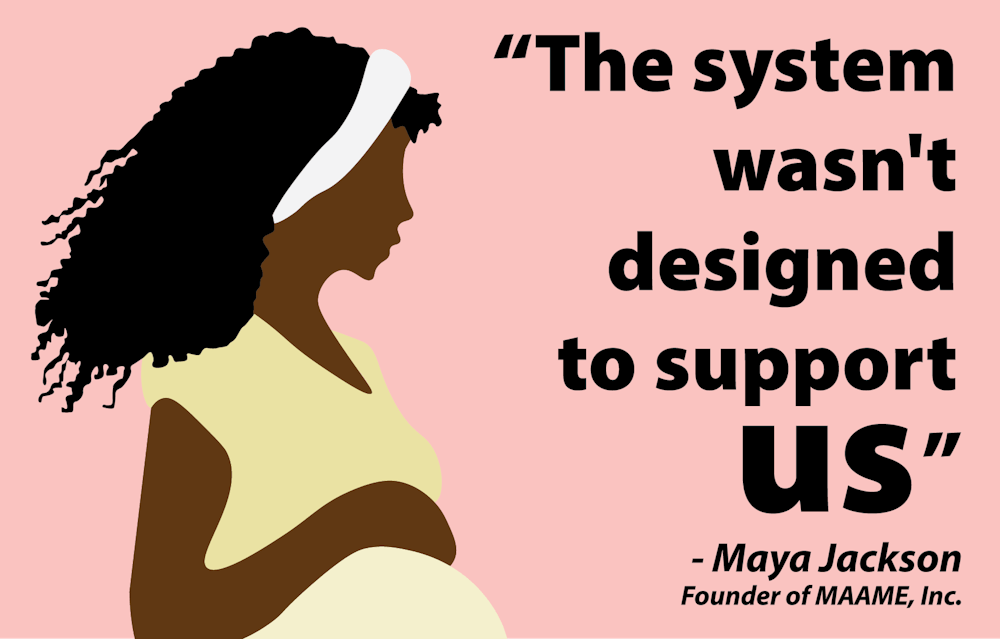After she had her first child, she told her doctor that she was in an abnormal amount of pain. It turned out that she had rhabdomyolysis, a condition caused by muscle breakdown that can be fatal.
“They kept telling me I was being overdramatic, exaggerating what I was feeling,” Thomas said.
The only time Thomas said she felt she was treated more fairly was during the birth of her second child. Chapel Hill Town Council member Jessica Anderson had driven her to the hospital and stayed with her.
“That was the only delivery that I had that went normally and it was because I had a white person advocating for me,” Thomas said.
According to a recent report from the National Center for Health Statistics, the maternal mortality rate for non-Hispanic Black women in 2020 was 55.3 deaths per 100,000 live births — almost 3 times the maternal mortality rate for white women.
The maternal mortality rate for Black women increased by just over 20 percent from 2019 to 2020, while the rate for white women did not increase significantly, the report showed. The mortality rate also increased for Hispanic women during the first year pandemic, despite historically being lower than the rate for white women.
“I do believe that the pandemic has exacerbated inequities and I think these data from the National Center for Health Statistics are alarming,” Isabel Morgan, a UNC doctoral student focusing on postpartum care, said. “They do in some ways suggest that the pandemic could have contributed to an increase in deaths.”
Many factors may contribute to these inequities in maternal health, including structural racism, access to care, how women are treated when they receive care and risk of complications, she said.
Morgan also serves as the director of the Birth Equity Research Scholars program for the National Birth Equity Collaborative, an organization focused on addressing Black maternal health and reproductive wellbeing.
She said a project done by NBEC on telehealth access found that many mothers did not have good experiences with it during the pandemic due to issues with internet access, technological challenges, rushed visits, inadequate support from providers and a lack of compassion.
The first step to overcoming disparities in health care for Black and Hispanic mothers is education, Venus Standard, an assistant professor in the UNC School of Medicine, said in an email. She noted it has been proven that many maternal mortality and morbidity cases could have been prevented.
"But it takes education, sensitivity, and awareness of the provider," Standard said. "It also takes acceptance of the medical community for the part that each provider and institution plays in fostering disparity and keeping institutional racism alive."
To get the day's news and headlines in your inbox each morning, sign up for our email newsletters.
Maya Jackson, who is a mother of four, founded a nonprofit in Durham to help address gaps in care for Black women. The organization, MAAME, Inc., trains community-based doulas to provide services to mothers of color.
“The system wasn't designed to support us," Jackson, who also serves as the nonprofit's executive director, said. "It was not designed to heal us, educate us, sustain us."
The pandemic also saw a shift to providing more teleheath. While the change lowered the risk of COVID-19 transmission, it also exacerbated existing maternal health disparities, Divya Mallampati, a maternal-fetal medicine fellow at UNC, said.
“What the pandemic did was, it made the health care system, obviously, so much more important because we were in a health care pandemic,” she said. “But in many ways, it made the health care system also less accessible in that we shifted more to telehealth.”
The pandemic has also affected whether doulas can be a part of their client’s birthing team, as many hospitals have implemented limited guest policies.
Jackson said some Black mothers prefer to consult doulas because they feel uncomfortable or unsafe in hospitals.
“A lot of them have decided, particularly during the pandemic, to opt out and birth at home by themselves because they're fearful of going into the hospital,” she said.
Mallampati said structural changes on every level are necessary to properly address the disparities in maternal health.
“It's administrators, it's policymakers, it's community members, leaders, organizers who all are equal and important voices in addressing maternal health disparities,” she said.
At the congressional level, some lawmakers, including Rep. Alma Adams of North Carolina’s 12th Congressional District, have advocated for maternal health equity.
Lat year, members of the Black Maternal Health Caucus introduced the Black Maternal Health Momnibus Act of 2021 to Congress. The package is made up of 12 bills that aim to address the maternal health crisis in the U.S.
Only one of the bills has passed since last year: the Protecting Moms Who Served Act of 2021. The bill focuses on maternity care for pregnant and postpartum veterans under the Department of Veteran Affairs.
The Momnibus act was passed in the U.S. House of Representatives in the Build Back Better Act in November. The bill was introduced in the U.S. Senate last month and has been referred to the Committee on Health, Education, Labor, and Pensions.
@emmymrtin | @DTHCityState
city@dailytarheel.com | elevate@dailytarheel.com
Emmy MartinEmmy Martin is the 2023-24 editor-in-chief of The Daily Tar Heel. She has previously served as the DTH's city & state editor and summer managing editor. Emmy is a junior pursuing a double major in journalism and media and information science.





